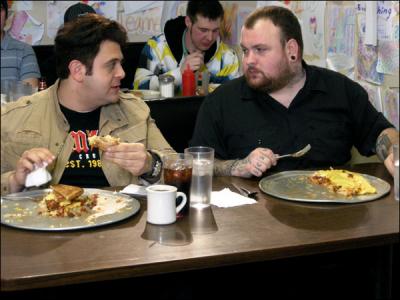Food and Politics Make Strange Bedfellows
Barry Garron - July 29, 2009

Never underestimate the ability of TV talent and executives to justify the unjustifiable and defend the indefensible. For examples we need look no further than the Travel Channel and CNN, networks that would otherwise seem to have little in common.
Example No. 1: The Travel Channel is promoting a series with the off-putting title, Man v. Food. The host, Adam Richman, goes around the country sampling local cuisine. Well, not really sampling. More like devouring, as he competes with others to see who can ingest the most the fastest.
However, by turning a deadly sin -- gluttony, in this case -- into a programming virtue, the Travel Channel unmistakably promotes binging and overeating, a big part of the obesity epidemic that plagues this nation.
This did not go unnoticed by TV writers, one of whom asked how eating a lot of food on TV is a good idea.
Answered Richman: "Here is the one thing that I would like to make abundantly clear: At no point do I or the network or the show espouse overeating. This is not about that. These are about once-in-a-blue-moon indulgences because at no point will we ever espouse eating like I eat or eating what I eat like a lifestyle choice."
He added: "I'm not doing it several times a week…. And I think if you do take steps to stave off the potentially adverse effects of things, which is what I do, you truly can have your cake and eat it, too."
Richman must have had one jalapeno pepper too many. While it is true that he does not urge viewers to consume a week's worth of calories in a single sitting, he doesn't caution them against it, either. At the very least, every one of his shows should start with the advisory: "Don't try this at home…or eating out."
Worse still, Richman gives the impression you can eat like he does and stay reasonably fit. Maybe you can if, like Richman, your employer supplies you with a personal trainer at home and on the road and you work out rigorously every day. But, oops, there's no mention of that in Man v. Food.
Example No. 2: CNN's Lou Dobbs, previously best known for his harangues against illegal immigration.
Lately, though, Dobbs has been devoting an inordinate amount of time to the so-called "birthers," the conspiracy wing nuts who maintain, despite overwhelming evidence to the contrary, that President Obama was not born in Hawaii and is not an American citizen.
Birth notices, witnesses and official records of the state of Hawaii all agree that Obama was born there. Indeed, when Dobbs took a night off, the substitute host of his show conclusively made the case that the "birthers" were about as rational as the members of the Flat Earth Society.
When Dobbs returned to the air, though, he continued to report on their wild and irrational charges, which served only to keep this non-issue alive.
Dobbs wasn't at the press tour but his boss, Jon Klein, president of CNN/U.S., was. He was asked why he allows Dobbs to keep plunging off the deep end.
Klein said the facts show that Obama was born in Hawaii. But, he said, those who irrationally disagree are making news by, in one instance, refusing to go with his military unit to Afghanistan or, in another case, by hurling the nonsensical charge during a public meeting with a Congressman. "So he (Dobbs) is exploring the flap."
This "flap," as Klein calls it, is the equivalent of sighting Elvis at a 7-Eleven store. Some people will believe anything but it has never been the job of a news operation to entertain nutty conspiracies, particularly ones that it has already disproved.
It's time to fess up. If Travel Channel, CNN or anyone else wants to goose their ratings by showcasing overeating or the wacky ideas of nut cases, no one can stop them. Only, please, let's come clean about the real motives for doing so.
Barry Garron is a freelance writer and TV critic who has covered the industry for more than 25 years for The Hollywood Reporter and The Kansas City Star. You can contact him at tv.critic@yahoo.com. He's reporting every other day from the 2009 Television Critics Association.
